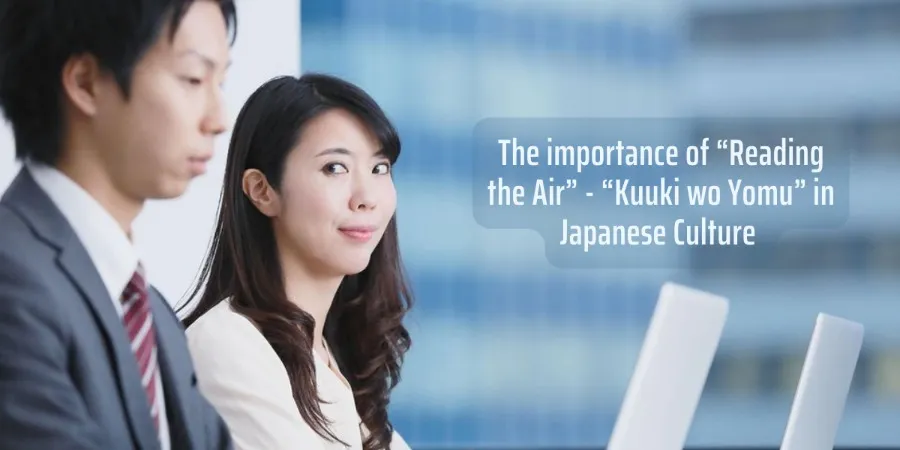The importance of “Reading the Air” - “Kuuki wo Yomu” in Japanese Culture
How to blend in and adapt to the life and culture of Japan is undoubtedly one of the main concerns of those currently or planning to live in the country. This requires a lot of skill, not only in terms of Japanese language proficiency but also the ability to “Read the Air” or “空気を読む.”

So what is “Reading the Air” and why is it so important in Japan? Let’s find out in this article with GoEMON!
1. What is “Reading the Air”?
Reading the Air, or “空気を読む” (Kuuki wo Yomu) in Japanese, refers to the Japanese culture of indirect communication. This term has a roughly equivalent meaning to the phrase “reading the room” in English, which can be understood as understanding the general mood and atmosphere in a social situation and observing the other party’s attitudes and expressions to act accordingly.
2. The Importance of Reading the Air in Japanese culture and society
As a country with a high-context culture, conversations in Japan rely heavily on unspoken context rules. Thus, the ability to read the air is regarded as an indispensable skill: those who can read the air will be able to blend in and make friends with ease, whereas those without this ability, in the worst-case scenario, might end up being outcasted by people. This skill is especially important in work settings, where just the tiniest slip can make or break a relationship or business deal.
3. The elements of Reading the Air
The act of reading the air in Japanese culture manifests itself in many different ways, from body language, and the use of certain words and actions, to speaking habits.
One example of this is the Japanese way of declining someone: people here never directly say “No” to an offer or flat-out reject anyone. Instead, they take a much more roundabout approach, such as giving vague, suggestive half-answers and then leaving it to the other party to take a hint and decipher the hidden meaning behind their answers.
For instance, let’s say your friend is inviting you out for dinner on Tuesday. Unfortunately, you are already occupied on that day. In some countries, it is completely fine to say directly to a friend that you will not be able to go. But the Japanese approach to this would be saying something along the lines of “それはちょっと、、、” (That day is a bit…) or ”行きたいんですが、、、” (I want to go, but…). As can be seen here, rather than directly declining the offer, the Japanese would express how they are feeling unsure as a hint to the other person that they would not be able to go instead.
4. Different states of Reading the Air
Reading the air can be divided into 3 states: Being able to read the air, unable to read the air, and reading the air way too much
- Being able to read the air “空気を読む”
This is to the standard level and is also the term used to refer to the Japanese culture of Reading the Air. The ability to read the air can help boost efficiency in communication and build relationships both in one’s daily life and at work.
- Unable to read the air “空気が読めない”
On the other hand, “空気が読めない” refers to those who are unable to understand the current atmosphere of social situations and thus lack the flexibility to adapt and act accordingly to the context at the time of the conversation. Thus, these people are often regarded as insensitive, rude, or selfish. As the ability to build strong relationships is seen as crucial for success, Japanese society believes that it would be challenging for those without the ability to read the air to become accomplished in life.
- Reading the air way too much “空気を読みすぎる”
As the saying “It is possible to have too much of a good thing” goes, although reading the air is good, excessive reading of the air may backfire and become harmful instead. Being considerate of the other party’s feelings and intentions in a conversation sure is good, but caring about it too much will end up placing a heavy burden on oneself and make one overly conscious about everything. Therefore, it is important to draw a line to determine when reading the air becomes excessive.
5. Learning how to read the air
There are many ways in which one can learn to read the air:
- Learn Japanese: One of the most obvious and effective ways that one can learn how to read the air in Japan is obviously to learn Japanese.
- Study Japanese body language: Mastering the Japanese language alone is not enough if you want to blend in with the community here: body language is also of paramount importance. Knowing the meaning of certain gestures can help you read the situation correctly, as well as present yourself nicely in social situations.
- Make Japanese friends: Another effective way to learn how to read the room is to make Japanese friends. You can naturally learn through observing how they interact with one another (and with yourself), as well as directly asking them how to act in certain social situations.
- Learn through games: Reading the air in Japan is so important to the point that there is even a game dedicated just to it. Launched in 2018, “Kuukiyomi” presents players with hundreds of situations that one may encounter in everyday life. There are no additional instructions or related information, and players have to rely on their gut feelings and act accordingly.
Kuuki wo yomu - reading the room, is indeed an interesting aspect of Japanese culture. Though an important skill to have, don’t pressure yourself too much trying to learn it, as even native Japanese struggle with it as well.
Don’t forget to follow GoEMON Global for the latest updates on life in Japan!